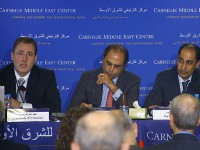Registration
You will receive an email confirming your registration.
IMGXYZ3343IMGZYXThe power shifts occurring across the Middle East and North Africa have revealed structural problems in the region’s existing development model and altered the relationship between key social, economic, and political stakeholders. At a discussion hosted by the Carnegie Middle East Center, Abdallah Al Dardari, former Syrian deputy prime minister for economic affairs, Jihad Azour, former Lebanese minister of finance, and Hedi Larbi, country director of the Middle East Department at the World Bank, offered their views on the economic lessons revealed by the Arab awakening and the reform priorities for the future. Carnegie’s Ibrahim Saif moderated.
An Unsustainable Development Paradigm
The Arab awakening revealed a number of significant deficiencies in the old development paradigm, Dardari stated. High regional growth rates and employment rates before 2010 concealed a number of important structural fragilities.
- Rentier Sector: The rentier sector was a key source of this growth, Dardari explained. This sector adds only low value to the economy and generally stifles competition. As a result, he concluded, the elasticity of employment with respect to growth remained depressed.
- Employment: Employment growth, while impressive on pape,r still lagged behind labor force growth as millions of youngsters entered the job market, Dardari added.
- Bad Growth: Much of the employment growth was generated in the already bloated public and informal sectors, with the latter accounting for over 50 percent of employment growth in the previous decade, Dardari said. As a result, many of the new jobs created were precarious, low-skilled, and low value-added.
- Taxes: Ill-targeted regressive taxes reinforced the incentives to operate in the informal sector, Dardari said.
- Uneven Aid: Dardari noted that only 30 percent of the Arab workforce benefited in some way from social assistance programs, despite high levels of poverty and unemployment.
Key Lessons
- Be Wary of Positive Statistics: Growth figures alone do not capture the health of the economic system, Dardari said. An economy’s composition and distributive implications must also be taken into account.
- Do Not Dismiss the Old Model Wholesale: The neo-classical economic paradigm that had governed the region has been discredited, and a new model must be developed. However, both Dardari and Azour warned against the hasty wholesale dismissal of the principles that governed the previous model. Some of the liberalization reforms enacted in the previous decade had real value, they said, arguing it is better to selectively import measures that have been found to work abroad.
- Creating Employment is Critical: Economic policy must be re-oriented around the creation of suitable employment, which Azour described as a ‘job-oriented growth model’.
Reform Priorities
While predictions for growth in oil and non-oil economies over the coming few years differ by as much as 3 percent, Azour argued that there are a number of structural economic fragilities common to both types of countries and economic reform is a crucial part of the transition to stability for the entire region. The participants identified a number of priorities that should guide the region’s reform process:
- Promote Trust Between the Citizen and the State: Such trust requires political participation, access to information, and accountability mechanisms, the participants agreed.
- Develop Human Capacity: Larbi noted that no Arab university ranks in the top 500 worldwide. Improvements in education will help spur much needed innovation in the region.
- Reform Social Protection Institutions: Social assistance projects in the Middle East and North Africa are among the costliest in the world, compromising 6-12 percent of GDP, explained someone. Not only is this level of expenditure unsustainable, but access to services, as well as the quality of those services, remains poor.
- Develop an Industrial Policy to Attract High Value-added Investment: Larbi highlighted the crucial role that well-crafted industrial policy continues to play in the dynamic emerging economies of Malaysia, China, and India.
- Establish a Regional Organization to Support the Transition: External aid packages pledged to the region so far are limited, Azour said. G8 initiatives are inevitably short-term measures, since the holder of the presidency rotates annually. He added that aid from individual Gulf countries has the advantage of increasing inter-Arab economic interaction, but its ad hoc nature makes it insufficient to adequately address the structural nature of the problem.
The Importance of Institutions
In order for economic reform to be successful, it must be matched by a sound institutional framework, Larbi argued. Such a framework is characterized by:
- Well-defined property rights
- Effective regulatory institutions
- Sound macroeconomic management, with an independent central bank
- An independent and efficient judicial system
Developing sound economic institutions is an involved and ongoing task, Larbi warned. Effective market institutions are not self-creating, self-regulating, self-stabilizing, or self-legitimizing.
